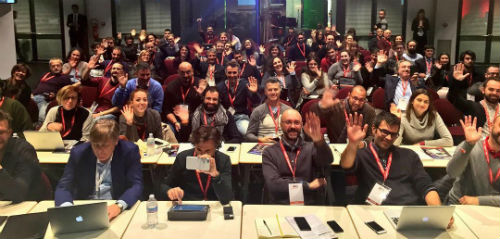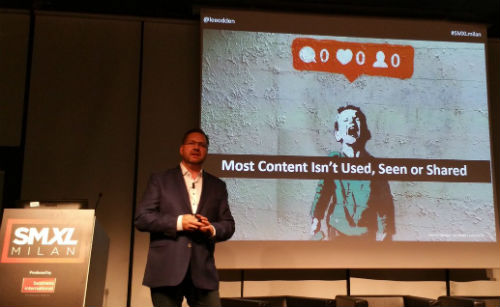
Content is both king and kingdom in a digital world full of stories. Brands and consumers alike are experiencing and publishing content on a daily basis. Between information overload, increased complexity of search engines and changes in consumer search behaviors, many marketers are less than confident about how to optimize their content marketing.
How can marketers best use content marketing to improve search marketing? How does search inspired content affect content, PR and marketing programs across channels?
At SMXL in Milan, Italy this November 15th, that's exactly what a panel of experts will be answering. I will be moderating Content Related Strategies for Search with Ken McGaffin, Lexi Mills and Jey Pandian where we'll be discussing strategies to help identify new opportunities to develop content based on business intelligence, competitive research and historical performance.
As a teaser for the panel, I've asked each speaker to share a preview of their talk with practical insights and tips.

Ken McGaffin @mcgaffinOnline PR and Link Building Strategist at Audiential
4 Rich Sources of People Stories"If you're reading this at 3 am, chances are that James Proud wants to put you in a deep slumber."
That's a great opening to an article on insomnia in the NYTimes.com. It paints a vivid picture, intrigues the reader and draws them in.
That's the power of story – it elevates your content and makes it unique.
Content Marketing is a competitive business and your pitches have to be top notch to succeed. Stories make yours stand out – to the delight of your target publishers and their readers. Here's some things we've discovered at Audiential:
4. You must encourage people to open up and that means you have to listen. There's an old saying, "We have two ears and one mouth, and we should listen and talk in the same proportion".

Lexi Mills @leximillsManaging Director at Marquis Communications
Design for Trends and Play the Long Game with Research ContentMany media are using new technology to tell them what subjects they should be covering. In some cases over 50% of the content they produce has to align with the trends these tools show. Making sure you are designing your content inline with an anticipated trend or pitching it in a way that allows them to cover a current one will significantly improve your media relationships, coverage and inbound link profile.
Don't plan to win on round one. Media are so busy these days that the likelihood of winning on the first point of contact is significantly lower than ever before. I have a strict rule with my team that they are not allowed to send an email or make a phone call without pre-planning what their follow up will be.
This can be anything from new images, interview slots becoming available to book or highlighting an emerging trend or event that the content fits in with. Not only does this ensure that they follow up in good time but it also feeds into the structure of campaigns.
Instead of releasing all research in one go we might decide to release it in phases or at a time when we know there will be a relevant event this allows for a more constructive follow-up. It also helps eliminate anyone tormenting a journalist with their pet hate…..an email that says "I just wanted to check you received my press release".

Jey Pandian @jeypandianChief Digital Officer & Founding Partner at ONWARD Agency
Storytelling in the Age of the OmnichannelSince the internet first started, the way people communicate has continuously evolved. Within each Search vertical, there are different types of content that need to be built out in order to meet customer demand. Jey will present a content framework that goes beyond search content to help lay the foundation for an omnichannel content play.
1. Analyze – Identify out where your audiences spend their time online on Social Media Platforms and Search Engines on a 24-hour timeline to figure out "moments of receptivity" and to ensure that content will be built and surfaced at the right time and place, in the right context.
2. Design – Study UX design patterns against each Search Engine design feature; whether infinite scroll, voice, mobile, and/or swiping patterns e.g. scrolling up and down or sideways to figure out how to design your asset for optimal consumer consumption.
3. Create – Understand your algorithmic limitations as it pertains to content consumption across each Search Engine; whether image, video, voice search and/or virtual reality to help figure out how to design your asset for optimal search visibility and in turn, consumer consumption.
 This will be the second time I've presented at SMXL Milan. Last year I gave a keynote presentation on influencer content collaboration. There were several speaker dinners and I think we counted 15 different countries represented at one of them. This really is an international search marketing event.
This will be the second time I've presented at SMXL Milan. Last year I gave a keynote presentation on influencer content collaboration. There were several speaker dinners and I think we counted 15 different countries represented at one of them. This really is an international search marketing event.
Whether you're simply trying to increase organic search visibility for the great content you've been publishing or if you want to create an advantage in a competitive market, leveraging search data can produce insights that are impactful for everything from storytelling, to media relations to omni-channel marketing. This panel with Ken, Lexi and Jey on Content Related Strategies for Search Marketing is ambitious and will cover many of these topics with plenty of time for audience Q and A.
I will be giving a solo presentation about content marketing at SMXL Milan on November 15th:

Photo of Lee Odden via Laura Caldarella? @LaSagitta
Content Marketing Integration – Without content, there wouldn't be any search engines and yet most marketers treat content as if it were simply a tactic for SEO. Content is the fuel that powers all forms of media on all digital channels where customers engage. The most successful marketers approach digital marketing with a customer and content-centric approach that integrates with SEO, social media and advertising in a way that helps the brand become "the best answer" wherever customers are looking. This presentation provides an overview of how to plan, produce, promote and optimize content as a marketing approach that works with or without search engines. But definitely better with search engines. 🙂
SMXL Milan features a truly impressive roster of speakers including Bill Hunt, Rand Fishkin, Michael King, Aleyda Solis, Gianluca Fiorelli, Hana Abaza, Bryan Eisenberg, Kristjan Mar Hauksson, Larry Kim, Nichola Stott, Jon Myers, Phil Nottingham, Cyrus Shepard and many more international search and digital marketing professionals. If you're a reader of our blog based in Europe, I hope you can make it to Milan in November!
Be sure to check out the conference website for more information.
Source: Content Marketing Tactics for Search Marketers – International Edition #SMXLmilan
No comments:
Post a Comment